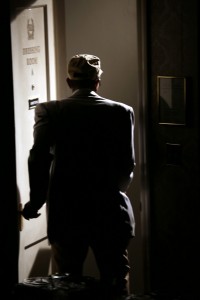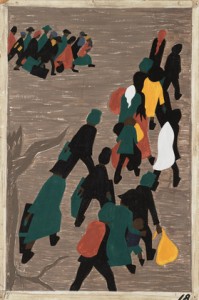 No, Zephyr Teachout and I are not related, at least so far as we know. Yes, we are good friends. (In fact, we call one another “Cuz” for fun.) I sought her out a number of years ago after running across her name in a news story, and we discovered at once that we liked each other. (Mrs. T likes her, too.) We go to the theater together whenever our schedules overlap. Yes, we disagree about a lot of things. No, that doesn’t matter in the least bit to either of us.
No, Zephyr Teachout and I are not related, at least so far as we know. Yes, we are good friends. (In fact, we call one another “Cuz” for fun.) I sought her out a number of years ago after running across her name in a news story, and we discovered at once that we liked each other. (Mrs. T likes her, too.) We go to the theater together whenever our schedules overlap. Yes, we disagree about a lot of things. No, that doesn’t matter in the least bit to either of us.
Satisfied?
UPDATE: And yes, I have lots of trans-ideological friendships. How about you?
One more thing: as long as you’re here, why not read something else?

 No doubt John was intensely aware, as I was, of the fact that the New York run of Satchmo will end on Sunday afternoon. While I have reason to expect that the show will be produced in other cities, and that John will perform it in at least some of those cities, it’s still going to be tough to ring down the figurative curtain (Satchmo, like most modern plays, doesn’t have an actual curtain) on the final performance.
No doubt John was intensely aware, as I was, of the fact that the New York run of Satchmo will end on Sunday afternoon. While I have reason to expect that the show will be produced in other cities, and that John will perform it in at least some of those cities, it’s still going to be tough to ring down the figurative curtain (Satchmo, like most modern plays, doesn’t have an actual curtain) on the final performance. “I thought of chewing her out in character,” John told me after the show. “It didn’t matter which character I was playing—I could have cussed her out as Satchmo, Joe Glaser, or Miles Davis. The only thing that stopped me was that I was afraid I’d go up in my lines. Otherwise I would have given her hell.”
“I thought of chewing her out in character,” John told me after the show. “It didn’t matter which character I was playing—I could have cussed her out as Satchmo, Joe Glaser, or Miles Davis. The only thing that stopped me was that I was afraid I’d go up in my lines. Otherwise I would have given her hell.”
 “From Walter there came an aura, a warm triumphant glow that made Jeffrey wonder whether all triumphs were not the same and whether the solace which anyone derived from them might not be based upon some half-forgotten slight.”
“From Walter there came an aura, a warm triumphant glow that made Jeffrey wonder whether all triumphs were not the same and whether the solace which anyone derived from them might not be based upon some half-forgotten slight.” In addition to being a popular rapper, Mr. Shakur was—to put it mildly—a piece of work. Born in 1971 to a pair of Black Panthers, he made his stage debut at 12 in a Harlem production of “A Raisin in the Sun,” cut his first solo album in 1991 (Dan Quayle denounced it), made his first movie in 1992, did time for “first-degree sexual assault” in 1995 and was killed in a drive-by shooting in 1996. His murderers were never found.
In addition to being a popular rapper, Mr. Shakur was—to put it mildly—a piece of work. Born in 1971 to a pair of Black Panthers, he made his stage debut at 12 in a Harlem production of “A Raisin in the Sun,” cut his first solo album in 1991 (Dan Quayle denounced it), made his first movie in 1992, did time for “first-degree sexual assault” in 1995 and was killed in a drive-by shooting in 1996. His murderers were never found.